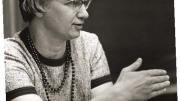When a group of Radcliffe students in the early 1960s complained to Mary Ingraham Bunting about the Harvard English department’s requirements, she suggested they “give a party, invite the right professors, and talk to them.”
It was rather startling advice from Radcliffe College’s fifth president, who is known primarily as a fighter for women’s professional advancement. But Polly Bunting embraced complexity. “I do think domestic skills are important,” she said, “and that learning to give the right party can be one of the more important things that a woman can do.” In the new dormitories whose building she oversaw, she made sure there were small kitchenettes and standard tools of domesticity—vacuum cleaners and sewing machines—as well as apartments for junior-faculty families with small children. As a widow raising a daughter and three sons alone, she knew how challenging parenthood was; if she had had any control over the Harvard curriculum, she would have made sure that there were more courses in child development. “I was trying to backstop the things that women do in their ordinary lives,” she said, “and show that we valued those things as well as the scholarly work for which we gave college credit.” Education at a residential college “need not and should not be limited to the curriculum.”
This innovative microbiologist and exacting educator also stood the world of women’s higher education upside down in 1961 with the establishment of the Radcliffe Institute for Independent Study. In a bold stroke, she convinced the trustees that Radcliffe should offer the chance to become professionally visible once again to older, often married, women who had been compelled for a variety of reasons to abandon promising careers. It was the first program of its kind in this country. Its purpose, she hoped, was to help alter what she called “the climate of unexpectation”: the invisible, corrosive assumption that women, no matter how well trained or how well educated, could do nothing of professional significance.
Bunting accommodated both the assumptions of her grandmothers and the aspirations of her granddaughters. She was impatient with either/or dichotomies and preferred to resolve those conflicts in favor of both. Women could have families and professions—niches as well as nests, as she phrased it. People should be able to work full-time or part-time depending upon where life was taking them, a pattern she likened to the interstate highway system with its clearly marked entrances and exits. Women should be able to leave the education highway when children were small and re-enter a bit later. She, herself, could be a scientist and a humanist, overseeing the interior decorating of the new dormitories and the landscaping of the campus while teaching a demanding freshman seminar on microbial genetics and administering a college during a challenging decade.
Bunting was the right person for Radcliffe during this tempestuous era—someone rooted in women’s traditional roles who also favored a transformation of those roles; someone able to take advantage of the moment of change and contribute to it. She had experience with reinvention. Just a few years before, she had reinvented herself, abandoning a life of scientific research and farming to take her first job in academic administration at 44. Her husband Henry had died suddenly of a brain tumor a year earlier, leaving her to raise and support their young children. Yale, where she had been doing her research, refused even to consider giving any woman the full-time job she needed, and so—without bitterness or rancor—she took the one job offered her, the deanship of Douglass College. Five years later, Radcliffe came calling.
Although she believed in the special opportunities offered by women’s colleges, where women could be sequestered from the pressure to strive for the approval of men, Bunting at the same time saw the advantages for Radcliffe students in a closer alliance with Harvard. In fact, she saw Radcliffe as a resource for all the women of Harvard—not only Radcliffe’s 1,200 undergraduates, for whom she felt a particular affection and responsibility, but also the women graduate students, the secretaries, the wives of Harvard’s graduate students, and the paltry number of women who held academic appointments at the University during her presidency. She supported the awarding of Harvard degrees to Radcliffe students, the establishment of residential units housing both women and men, and the closer linking of the staffs of both institutions. At the same time she spoke for a strong Radcliffe voice within the University. Bunting guided Radcliffe into Harvard’s orbit to compel Harvard to recognize its full responsibility for its female students and to offer them access to the full range of its facilities and resources. She saw to it that all doors—not just Lamont Library’s—were opened to Radcliffe women.
The concept of evolution had fascinated her since childhood. She understood the inevitability of change and saw leadership as guiding and influencing that change. And this process, it seemed obvious to her, would prove to be much more productive in the atmosphere of a dinner party than in that of a battlefield.
Elaine Gordon Yaffe ’59 is the author of the recently published Mary Ingraham Bunting: Her Two Lives (Frederic C. Beil), the first biography of Radcliffe’s fifth president, who served from 1960 to 1972.






